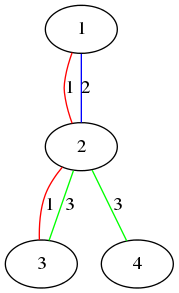Problem B. Mr. Kitayuta's Colorful Graph
时间限制 1000 ms 内存限制 256 MBMr. Kitayuta has just bought an undirected graph consisting of n vertices and m edges. The vertices of the graph are numbered from 1 to n. Each edge, namely edge i, has a color ci, connecting vertex ai and bi.
Mr. Kitayuta wants you to process the following q queries.
In the i-th query, he gives you two integers — ui and vi.
Find the number of the colors that satisfy the following condition: the edges of that color connect vertex ui and vertex vi directly or indirectly.
输入数据
The first line of the input contains space-separated two integers — n and m (2 ≤ n ≤ 100, 1 ≤ m ≤ 100), denoting the number of the vertices and the number of the edges, respectively.
The next m lines contain space-separated three integers — ai, bi (1 ≤ ai < bi ≤ n) and ci (1 ≤ ci ≤ m). Note that there can be multiple edges between two vertices. However, there are no multiple edges of the same color between two vertices, that is, if i ≠ j, (ai, bi, ci) ≠ (aj, bj, cj).
The next line contains a integer — q (1 ≤ q ≤ 100), denoting the number of the queries.
Then follows q lines, containing space-separated two integers — ui and vi (1 ≤ ui, vi ≤ n). It is guaranteed that ui ≠ vi.
输出数据
For each query, print the answer in a separate line.
样例
样例说明
Let's consider the first sample.
 The figure above shows the first sample.
The figure above shows the first sample.
- Vertex 1 and vertex 2 are connected by color 1 and 2.
- Vertex 3 and vertex 4 are connected by color 3.
- Vertex 1 and vertex 4 are not connected by any single color.